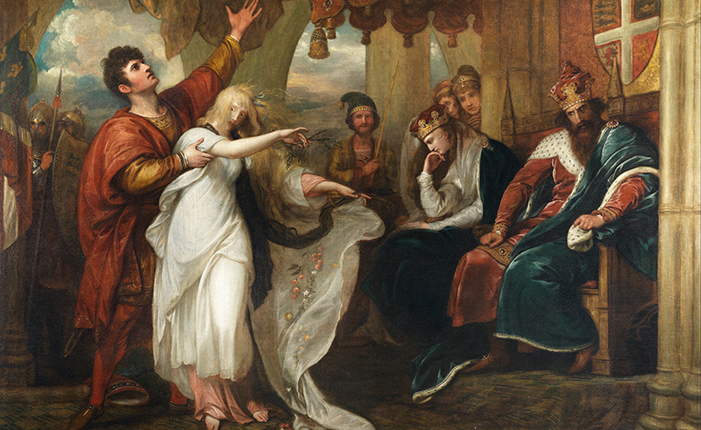Blogging Hamlet: Part 10

I’m not trying to tell Shakespeare how to do his job, mostly because he wrote Hamlet and I didn’t. But if you’re going to use a pirate attack as a plot device, at least have the decency to make it happen onstage. I want to see a sword fight! I deserve a sword fight!
You’ll remember that last time, Claudius had Hamlet shipped off to England, where Hamlet was set to be murdered by the English king. Laertes then arrived in Denmark to kill Claudius for killing Polonius, which Claudius didn’t actually do. Also Ophelia showed up, except she’s currently insane. Here is an artist’s depiction of the whole wacky scene, featuring Laertes looking like he just realized he’s in a play and Gertrude looking like she’s saying, “Well isn’t this just embarrassing for everyone involved.”

Wikimedia Commons
Also of note: Claudius does not seem to understand what’s going on with Ophelia’s shawl. I don’t understand it, either. Just how many shawls is she wearing?
Anyway, in Act 4, Scene 6, we learn that Hamlet never made it to England.
Horatio is just hanging out, doing whatever it is he does when Hamlet’s not ruining his life with drama, when some sailors approach. One of them gives him a letter. It’s from Hamlet. Hamlet tells Horatio there’s been a really convenient pirate attack, that he was taken prisoner, and that they’ve brought him back to Denmark. Confusingly, Rosencrantz and Guildenstern are still on their way to England. I want to know what went down with the pirates specifically, because “YEAH WE’LL JUST KIDNAP THIS ONE GUY AND NOT STRIP THIS SHIP OF ALL ITS RICHES” does not sound like the sixteenth-century pirate stereotype with which I am familiar. But I guess Hamlet didn’t feel the need to explain this situation further, because he doesn’t.
He tells Horatio the sailors have a message for Claudius. He wants Horatio to show them where to go and then come find him, “with as much speed as thou wouldst fly death.” Hamlet has something important to tell Horatio, but he won’t say what. All he says is:
I have words to speak in thine ear will make thee dumb, yet are they much too light for the bore of the matter.
Good old Elizabethan clickbait.
In Act 4, Scene 7, Claudius has successfully proven his innocence. He had nothing to do with the death of Polonius; that was all Hamlet. However, Laertes now wants to know why Claudius didn’t immediately punish Hamlet once they discovered the body. Claudius has his reasons. They are:
- Gertrude loves Hamlet, and Claudius loves Gertrude, and he would like to continue having sex with her
- The common people also love Hamlet (and they wouldn’t look too fondly on Claudius if he were to put Hamlet in prison)
Basically, Claudius decided to let a murderer walk free because of the havoc it might wreak on his personal life. What a wise and selfless ruler. He goes on to say that the public loves Hamlet so much that it blinds them to his faults. This I understand. It’s like me with Daniel Radcliffe. I’m convinced Daniel Radcliffe can do no wrong. He could set my house on fire in front of me and I’d probably just say, “I loved you in Horns.”
Suddenly, a messenger arrives! He delivers what is probably the least informative letter of all time, but let’s peruse it together. There’s a lot to unpack:
High and mighty,
You shall know I am set naked* on your kingdom. Tomorrow shall I beg leave to see your kingly eyes, when I shall, first asking your pardon thereunto, recount the occasion of my sudden and more strange return.**
Hamlet
P.S. Alone.***
* Is he running around Elsinore naked?
** More clickbait.
*** YEAH THIS IS DEFINITELY NOT A MURDER TRAP.
Claudius and Laertes are completely baffled. They, too, want to know what Hamlet means by “naked” (does he have all of his clothes off or just some of his clothes off?) and whether the whole crew is back in Denmark or just Hamlet.
Actually, Laertes isn’t too fussed about the details. He’s just glad Hamlet is back in the country so he’ll have the chance to look him square in the eye and say, “YOU DID THIS.” I want to do that also, but with M. Night Shyamalan. He knows what he did.
Claudius asks Laertes how far he’d be willing to go to prove that he truly loved his father—”in deed…more than in words.” This mirrors the conversation Hamlet once had with his father’s ghost, and it speaks to the inner turmoil he’s been struggling with.
Hamlet has spent most of this play talking about getting revenge but not actually doing it. Laertes, on the other hand, says he’s willing “to cut [Hamlet’s] throat i’ the’ church.” Seems excessive, but it highlights the contrast between Hamlet and Laertes. Remember how Hamlet couldn’t bring himself to kill Claudius while Claudius was praying? Laertes is no Hamlet. Laertes would kill you in front of God himself and also your weeping mother.
Claudius is like, “Okay, hold up.” He suggests they find a way to kill Hamlet and make it look like an accident. Hamlet has always been jealous of Laertes’ skill with the sword; perhaps they could goad him into a friendly duel. Unbeknownst to Hamlet, however:
- Laertes will be using a sharpened sword instead of a customary dull-tipped fencing blade.
- The tip of said sword will be dipped in poison.
- If those first two things don’t kill him because Hamlet somehow wins the duel, Claudius will offer him a congratulatory cup of poisoned wine.
With so many murder weapons in play, I’m sure there’s no way this could go wrong. The good news? I’m finally getting my sword fight! Woohoo!
And we COULD have ended on that delightful note, but this is a Shakespeare play, so Gertrude enters the room and informs us all that Ophelia has drowned. When prompted by Laertes (“Drowned? Oh, where?”), she elaborates. Ophelia was making a flower crown when she fell in the river. She continued to lie there, buoyed above the water by her 75 inexplicable shawls, until eventually she was pulled under. She was also singing to herself when she died. I have no clue how Gertrude knows the specifics of this, but that’s probably a dumb question and I’m a dumb person for asking it because no one else cares.
In fact, the only person who’s bothered about the fact that we just lost 50% of the play’s female characters is Laertes. He begins sobbing, apologizes for being such a woman about this (PSA: men do not cry, they just FIX CARS AND PUNCH THINGS), and runs away. Claudius is like, “We should go after him. I worked really hard to turn that guy into my own personal rage assassin and I don’t want to have to start over.”
EXEUNT.
THOUGHTS:
- Nineteenth-century artists were obsessed with Ophelia’s drowning. There are upwards of a million paintings on the subject, and they range from “Ophelia taking a nap in a river” to “Ophelia was a mermaid all along and now she must return to the sea.”
- I honestly expected Laertes to be more broken up about Ophelia. Remember when they were talking about her sex life back in Act 1, and he made it super weird?
Catch up on parts 1 through 9 of Blogging Hamlet here, or go check out the SparkNote!















